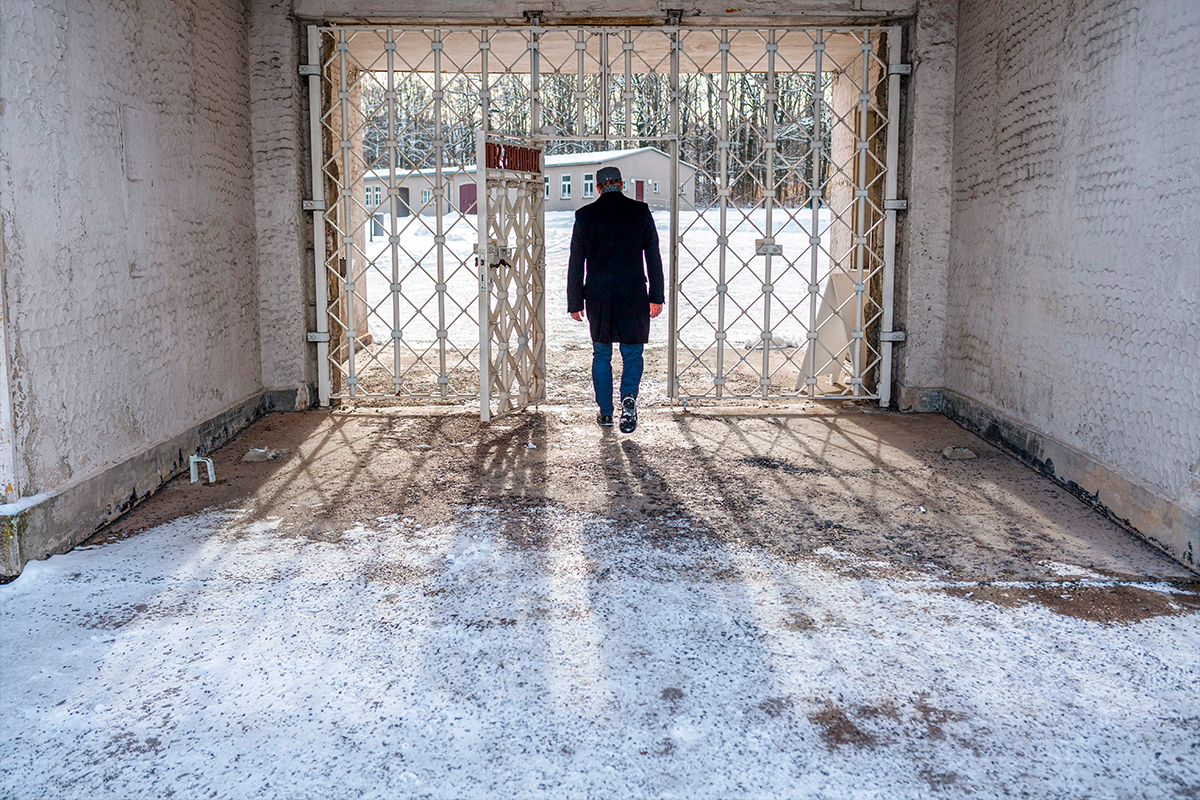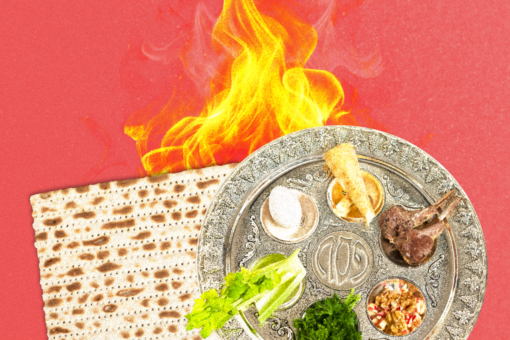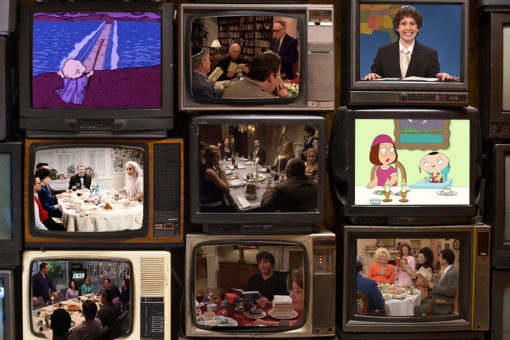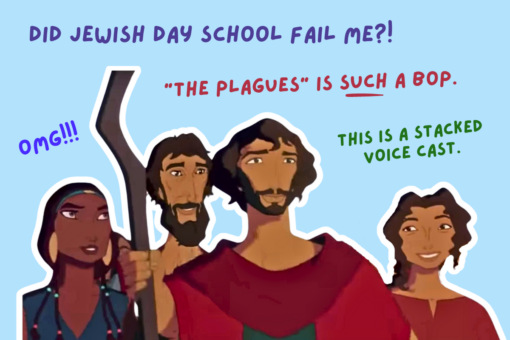Growing up on the Upper West Side of New York City, being Jewish was very common. It was not lost on me how fortunate I was that I did not have to experience a lot of antisemitism in school or with friends.
My dad also grew up on the Upper West Side — after he immigrated to the U.S. from Germany in 1949 with his parents when he was 4 years old. My dad constantly talks about the ways in which the neighborhood has changed since he was young, but I know the one thing that remained consistent was the omnipresent Jewish community.
Often, I’d find myself in the company of an adult with their own story about how their family escaped Hitler, or of others who lost family in the Holocaust. And even though my dad rarely brought it up, I always knew my family had a story of our own.
My dad was born in a concentration camp, which makes him one of an estimated 300 people to have been born in such conditions. He was born on March 23, 1945 in Leipzig, Germany at the Leipzig-Schönefeld labor camp. His parents, Samuel and Fela, had been in the Skarżysko-Kamienna labor camp for two years, during which my father was conceived before the couple was separated. His father was sent to Buchenwald, one of the largest concentration camps, and his mother was sent to Leipzig-Schönefeld, a women’s labor camp that produced munitions. My father never got a chance to meet his sister, who was only 4 years old when she was taken from her parents and killed in the gas chambers along with his grandmother.
Before middle school, I knew parts of his story, but I knew he was not giving me the full picture. Looking back now, I understand why: How do you explain this sort of thing to a 10-year-old?
In sixth grade, we started learning about the Holocaust in more depth, which eventually led to watching the documentary Paper Clips. That documentary led me to full hysterics and a panic attack in front of my entire middle school class. It was only then that I was old enough to realize why my dad hardly brought up his story, and why his parents rarely ever talked about it with him.
I soon developed a deep connection to my dad’s story and the stories of so many other Holocaust survivors, including the stories of our family friends. Being the curious person I am, it took a while for me to be able to ask all the questions I wanted to while still respecting my dad’s feelings on the subject. Every time I asked a question about my grandparents’ story, it was done so with intention and attention to detail. Whatever I didn’t want to ask him, I would eventually search for on the internet or in school.
The older I got, the more these stories of tragedy were woven into discussions and into our curriculum. I ended up studying history at Hunter College with a concentration on Jewish history and 20th century Europe. In 2015, when I was a junior, I found out that there was an entire article written about my dad’s story that he never read. The article was featured in a prominent Yiddish newspaper at the time, Der Tog (The Day), and was titled “Jewish Boy, Born in a Nazi Camp, Becomes Bar Mitzvah in New York” (Wed., June 18, 1958). Although the article was written in Yiddish, I knew I had to get him to translate it. So I took it upon myself to be the annoying pushy oldest daughter and made sure it got done. Through the amazing world of Jewish geography, we got in touch with a writer, Rivka Schiller, who could translate the article for us.
Rivka took so much interest in my family’s story that she ended up writing an article about the story in the British newspaper, the Independent. Soon after, my dad was contacted by Mackenzie Lake from the Buchenwald Memorial Site who invited him to commemorate the 71st Anniversary of the Liberation of the Buchenwald Concentration Camp in Germany.
At first, my dad was apprehensive; he vowed his entire life to never visit Germany, for obvious reasons. But with some convincing, I got him to agree. It is not often you get an all-expense paid trip to learn more about your family’s history and he wanted me to be his plus-one.
In April 2016, we traveled to Weimar, Germany where the Buchenwald Concentration Camp was located. For a week, we stayed in a hotel alongside 30 other Holocaust survivors from all over the world, their plus-ones, and a group of younger people who worked at the Memorial site. We were paired up with a boy my age, Johannes, who was going to be with us throughout the week to help us learn more about our family’s history and show us around.
We spent every morning talking to other survivors and hearing their stories. On the day of the commemoration, we visited Buchenwald itself, and I couldn’t begin to fathom how much strength and courage these survivors had while they shared their stories to an audience in the very camp that held their darkest memories.
A few weeks prior to our trip, Mackenzie connected us with Anja Kruse and Sebastian Schönemann, who worked at the small museum in Leipzig on the site of the labor camp where my grandmother was held. My dad and I knew we wanted to visit Leipzig and the concentration camp where my dad was actually born, but didn’t know what to expect. After an hour and a half of driving, we were greeted by Anja and Sebastian, and I don’t think my dad nor I realized how much we would learn from this visit.
To our surprise, they handed us a binder filled with every official Nazi document and testimonies they could find about our family. With over 50 pages, we spent hours with them while they answered our questions and translated documents for us. My dad and I were so taken aback by how meaningful this visit was and how much effort was put into it. We were learning details about my grandmother at the very place they happened. We learned how my grandmother wore rags to cover her pregnant stomach to go undetected by the SS soldiers. When the SS soldiers threatened to kill everyone if they had found out someone was pregnant, my grandmother gave herself up. She was then put on the list of prisoners that were to be sent off to the gas chambers, but because the liberation had already started, no more trains were sent out and that’s how it happened: My father was miraculously born.
General George Patton’s Third U.S. Army liberated Buchenwald on April 11, 1945. Patton was so disturbed by what he saw that he ordered 1,000 of Weimar’s German citizens to march four miles and witness what had been happening at Buchenwald and what they allowed. General Dwight Eisenhower, who was also appalled, invited members of Congress and journalists to tour Buchenwald days after the liberation. Seventy-one years later, we traveled the same four miles. Even though our trip was quite different, it was just as important for all of us to see our history and what our families lived through.
My dad is still in awe of the effort that was put in by people who dedicated themselves to filling in the missing pieces of our family’s story. After the trip, the binder was placed right next to our photo albums and still serves as a constant reminder of our past, as a family, and as Jews collectively. The other survivors on our trip taught us how crucial it is to retell these stories no matter how hard it is at times.
Years later, my dad and I are still overcome with emotion. We never knew how grateful we would be to strangers for a once in a lifetime experience that would forever connect me to the grandparents I never knew and my dad to the stories he was never told.



